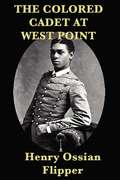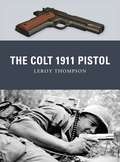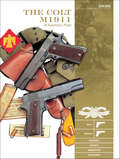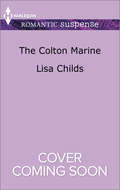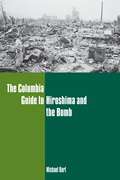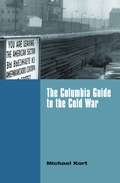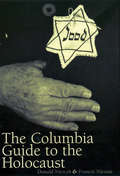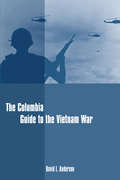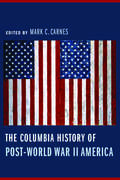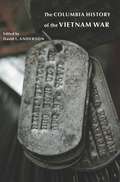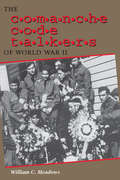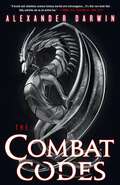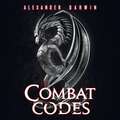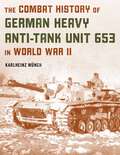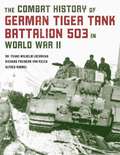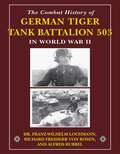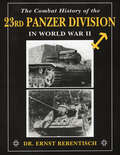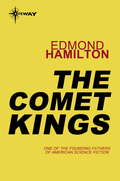- Table View
- List View
The Colored Cadet at West Point
by Henry Ossian FlipperHenry Ossian Flipper (21 March 1856 - 3 May 1940) was an American soldier, former slave, and the first African American to graduate from the United States Military Academy at West Point in 1877, earning a commission as a 2nd Lieutenant in the US Army.
The Colours: a captivating, epic historical drama about family, love and loss
by Juliet Bates'A carefully crafted, totally engaging epic family drama' Yorkshire Post'Delightful' Daily Mail Da said the Pearson family came out of the sand. He said they were born out of the red clarty sand that stuck to the soles of boots and the hems of frocks.You couldn't just brush the sand away, you had to beat your clothes with the palm of your hand like you were smacking them for being naughty. You had to bang your boots against the doorstep and find a knife to gouge away the sand that clung to the heels and round the stitching.Ellen has a unique view of the world but living in a tiny town in the north-east of England, in a world on the cusp of war, no one has time for an orphaned girl who seems a little odd. When she is taken in to look after a rich, elderly widow things seem to be get better, despite musty curtains and an aging employer completely out of touch with the world. But pregnancy out of wedlock spoils all this, and Ellen is unable to cope. How will Jack, her son, survive - alone in the world as his mother was? Can they eventually find their way back to each other?The Colours is a sweeping novel of how we can lose ourselves, and our loved ones, for fans of Kate Atkinson and Virginia Baily.
The Colours: a captivating, epic historical drama about family, love and loss
by Juliet Bates'A carefully crafted, totally engaging epic family drama' Yorkshire Post'Delightful' Daily Mail Da said the Pearson family came out of the sand. He said they were born out of the red clarty sand that stuck to the soles of boots and the hems of frocks.You couldn't just brush the sand away, you had to beat your clothes with the palm of your hand like you were smacking them for being naughty. You had to bang your boots against the doorstep and find a knife to gouge away the sand that clung to the heels and round the stitching.Ellen has a unique view of the world but living in a tiny town in the north-east of England, in a world on the cusp of war, no one has time for an orphaned girl who seems a little odd. When she is taken in to look after a rich, elderly widow things seem to be get better, despite musty curtains and an aging employer completely out of touch with the world. But pregnancy out of wedlock spoils all this, and Ellen is unable to cope. How will Jack, her son, survive - alone in the world as his mother was? Can they eventually find their way back to each other?The Colours is a sweeping novel of how we can lose ourselves, and our loved ones, for fans of Kate Atkinson and Virginia Baily.
The Colt 1911 Pistol
by Peter Dennis Leroy ThompsonFirst used in combat during the Punitive Expedition into Mexico and then extensively during both World War 1 and World War 2, the Colt Government Model (1911) pistol remained the standard issue handgun in the US armed forces for nearly 80 years and has continued in service with some units to this day. In fact, the M1911 has seen a resurgence among US Special Operations units, as US Marine MARSOC and MEUSOC personnel are issued current generation 1911-type pistols. In addition, the pistol has seen service with famous law enforcement agencies such as the Shanghai Municipal Police, LAPD Swat and Texas Rangers. Nearly a century after its introduction, the M1911 Pistol remains a popular design and is now produced by virtually every major firearms manufacturer doing business in the USA.In this new volume, handgun expert Leroy Thompson sheds new light on the development, history and use of this revolutionary handgun, complete with specially-commissioned artwork depicting the firing process and cutaway profile of the gun, as well as its use in various theaters of war.From the Trade Paperback edition.
The Colt M1911: .45 Automatic Pistol (Classic Guns of the World #4)
by Jean HuonOne of the most well-known and popular military weapons of the 20th centuryStandard-issue sidearm of the US armed forces for more than 70 yearsClose-up views of markings, as well as a serial numbers list, and a visual breakdown of the weapon
The Colton Marine
by Lisa ChildsHeart-racing romance, breathless suspense A troubled hero returns home to a family nightmare in this thrilling Coltons of Shadow Creek tale! Hired to renovate his family's former mansion, River Colton hopes to find answers to his deepest questions. Plagued by memories of his fugitive mother, the ex-marine finds danger to his life in the estate’s secret chambers—and danger to his heart in Edith Beaulieu, its beautiful new guardian. But someone doesn't want Edith or River in the seemingly haunted house. When Edith falls victim to too many “accidents”—and falls hard for River—the Texas loner risks everything to protect her. If the ghosts of Coltons past lurk in the shadows, it’s up to Edith and River to hunt them down… The Coltons of Shadow Creek: Only family can keep you safe… Discover the full miniseries below Book 1: Colton’s Secret Son by Carla Cassidy Book 2: Colton Undercover by Marie Ferrarella Book 3: Pregnant by the Colton Cowboy by Lara Lacombe Book 4: Cold Case Colton by Addison Fox “High stakes and intense emotions make this passionate read a sizzling addition…”—RT Book Reviews
The Columbia Guide to Hiroshima and the Bomb
by Michael KortFew decisions in American history have been as important-or as debated-as the decision by Harry Truman to drop the atomic bomb on Japan. In this book, Michael Kort provides readers and researchers with a well-crafted and evenhanded narrative tracing the bomb's development; the thinking behind the decision to use this weapon as well as the debates that followed in the wake of Hiroshima and Nagasaki. Part II of the volume contains a set of primary source documents.
The Columbia Guide to Hiroshima and the Bomb (Columbia Guides to American History and Cultures)
by Michael KortFew aspects of American military history have been as vigorously debated as Harry Truman's decision to use atomic bombs against Japan. In this carefully crafted volume, Michael Kort describes the wartime circumstances and thinking that form the context for the decision to use these weapons, surveys the major debates related to that decision, and provides a comprehensive collection of key primary source documents that illuminate the behavior of the United States and Japan during the closing days of World War II.Kort opens with a summary of the debate over Hiroshima as it has evolved since 1945. He then provides a historical overview of thye events in question, beginning with the decision and program to build the atomic bomb. Detailing the sequence of events leading to Japan's surrender, he revisits the decisive battles of the Pacific War and the motivations of American and Japanese leaders. Finally, Kort examines ten key issues in the discussion of Hiroshima and guides readers to relevant primary source documents, scholarly books, and articles.
The Columbia Guide to the Cold War (Columbia Guides To American History And Cultures)
by Michael KortThe Cold War was the longest conflict in American history, and the defining event of the second half of the twentieth century. Since its recent and abrupt cessation, we have only begun to measure the effects of the Cold War on American, Soviet, post-Soviet, and international military strategy, economics, domestic policy, and popular culture. The Columbia Guide to the Cold War is the first in a series of guides to American history and culture that will offer a wealth of interpretive information in different formats to students, scholars, and general readers alike. This reference contains narrative essays on key events and issues, and also features an A-to-Z encyclopedia, a concise chronology, and an annotated resource section listing books, articles, films, novels, web sites, and CD-ROMs on Cold War themes.
The Columbia Guide to the Holocaust
by Donald Niewyk Francis NicosiaOffering a multidimensional approach to one of the most important episodes of the twentieth century, The Columbia Guide to the Holocaust offers readers and researchers a general history of the Holocaust while delving into the core issues and debates in the study of the Holocaust today. Each of the book's five distinct parts stands on its own as valuable research aids; together, they constitute an integrated whole. Part I provides a narrative overview of the Holocaust, placing it within the larger context of Nazi Germany and World War II. Part II examines eight critical issues or controversies in the study of the Holocaust, including the following questions: Were the Jews the sole targets of Nazi genocide, or must other groups, such as homosexuals, the handicapped, Gypsies, and political dissenters, also be included? What are the historical roots of the Holocaust? How and why did the "Final Solution" come about? Why did bystanders extend or withhold aid? Part III consists of a concise chronology of major events and developments that took place surrounding the Holocaust, including the armistice ending World War I, the opening of the first major concentration camp at Dachau, Germany's invasion of Poland, the failed assassination attempt against Hitler, and the formation of Israel.Part IV contains short descriptive articles on more than two hundred key people, places, terms, and institutions central to a thorough understanding of the Holocaust. Entries include Adolf Eichmann, Anne Frank, the Warsaw Ghetto, Aryanization, the SS, Kristallnacht, and the Catholic Church. Part V presents an annotated guide to the best print, video, electronic, and institutional resources in English for further study.Armed with the tools contained in this volume, students or researchers investigating this vast and complicated topic will gain an informed understanding of one of the greatest tragedies in world history.
The Columbia Guide to the Vietnam War
by David AndersonThe Vietnam War remains a major point of reference in discussions of U.S. foreign policy and national character. The lessons and legacies of the most divisive event in U.S. history in the twentieth century are hotly debated to this day. Written by a renowned scholar of the conflict, The Columbia Guide to the Vietnam War provides students and researchers with the materials to think seriously about the conflict's many paradoxes and ramifications.
The Columbia Guide to the Vietnam War (Columbia Guides to American History and Cultures)
by David AndersonMore than a quarter of a century after the last Marine Corps Huey left the American embassy in Saigon, the lessons and legacies of the most divisive war in twentieth-century American history are as hotly debated as ever. Why did successive administrations choose little-known Vietnam as the "test case" of American commitment in the fight against communism? Why were the "best and brightest" apparently blind to the illegitimacy of the state of South Vietnam? Would Kennedy have pulled out had he lived? And what lessons regarding American foreign policy emerged from the war?The Columbia Guide to the Vietnam War helps readers understand this tragic and complex conflict. The book contains both interpretive information and a wealth of facts in easy-to-find form. Part I provides a lucid narrative overview of contested issues and interpretations in Vietnam scholarship. Part II is a mini-encyclopedia with descriptions and analysis of individuals, events, groups, and military operations. Arranged alphabetically, this section enables readers to look up isolated facts and specialized terms. Part III is a chronology of key events. Part IV is an annotated guide to resources, including films, documentaries, CD-ROMs, and reliable Web sites. Part V contains excerpts from historical documents and statistical data.
The Columbia History of Post-World War II America
by Mark C. CarnesA unique cultural history of the American postwar experience that examines how important topics and themes intersect, often in surprising ways.
The Columbia History of the Vietnam War
by David L. AndersonAmerica's experience in Vietnam continues to figure prominently in debates over strategy and defense and within the discourse on the identity of the United States as a nation. Through fifteen essays rooted in recent scholarship, The Columbia History of the Vietnam War is a chronological and critical collective history central to any discussion of America's interests abroad. David Anderson opens with an essay on the Vietnam War's major themes and enduring relevance. Mark Philip Bradley (University of Chicago) reexamines the rise of Vietnamese revolutionary nationalism and the Vietminh-led war against French colonialism. Richard Immerman (Temple University) revisits Eisenhower's and Kennedy's efforts at nation-building in South Vietnam. Gary Hess (Bowling Green State University) reviews America's military commitment under Kennedy and Johnson, and Lloyd Gardner (Rutgers University) investigates the motivations behind Johnson's escalation of force. Robert McMahon (Ohio State University) focuses on the pivotal period before and after the Tet Offensive, and Jeffrey Kimball (Miami University) makes sense of Nixon's paradoxical decision to end U. S. intervention while pursuing a destructive air war. John Prados (National Security Archive) and Eric Bergerud (Naval Postgraduate School) devote their essays to America's military strategy. Helen Anderson (California State University, Monterey Bay) and Robert Brigham (Vassar College) explore the war's impact on Vietnamese women and urban culture. Melvin Small (Wayne State University) recounts the domestic tensions created by America's involvement in Vietnam, and Kenton Clymer (Northern Illinois University) follows the spread of the war to Laos and Cambodia. Concluding essays by Robert Schulzinger (University of Colorado) and George Herring (University of Kentucky) trace the legacy of the war within Vietnamese and American contexts and diagnose the symptoms of the "Vietnam Syndrome" evident in later U. S. foreign policy debates.
The Columbia History of the Vietnam War (Columbia Guides To American History And Cultures (coup) Ser.)
by Ed. Anderson David L.Rooted in recent scholarship, The Columbia History of the Vietnam War offers profound new perspectives on the political, historical, military, and social issues that defined the war and its effect on the United States and Vietnam. Laying the chronological and critical foundations for the volume, David L. Anderson opens with an essay on the Vietnam War's major moments and enduring relevance. Mark Philip Bradley follows with a reexamination of Vietnamese revolutionary nationalism and the Vietminh-led war against French colonialism. Richard H. Immerman revisits Eisenhower's and Kennedy's efforts at nation building in South Vietnam, and Gary R. Hess reviews America's military commitment under Kennedy and Johnson. Lloyd C. Gardner investigates the motivations behind Johnson's escalation of force, and Robert J. McMahon focuses on the pivotal period before and after the Tet Offensive. Jeffrey P. Kimball then makes sense of Nixon's paradoxical decision to end U.S. intervention while pursuing a destructive air war.John Prados and Eric Bergerud devote essays to America's military strategy, while Helen E. Anderson and Robert K. Brigham explore the war's impact on Vietnamese women and urban culture. Melvin Small recounts the domestic tensions created by America's involvement in Vietnam, and Kenton Clymer traces the spread of the war to Laos and Cambodia. Concluding essays by Robert D. Schulzinger and George C. Herring account for the legacy of the war within Vietnamese and American contexts and diagnose the symptoms of the "Vietnam syndrome" evident in later debates about U.S. foreign policy. America's experience in Vietnam continues to figure prominently in discussions about strategy and defense, not to mention within discourse on the identity of the United States as a nation. Anderson's expert collection is therefore essential to understanding America's entanglement in the Vietnam War and the conflict's influence on the nation's future interests abroad.
The Comanche Code Talkers of World War II
by William C. MeadowsThe true story of the US Army’s Comanche Code Talkers, from their recruitment and training to active duty in World War II and postwar life.Among the allied troops that came ashore in Normandy on D-Day, June 6, 1944, were thirteen Comanches in the 4th Infantry Division, 4th Signal Company. Under German fire they laid communications lines and began sending messages in a form never before heard in Europe?coded Comanche. For the rest of World War II, the Comanche Code Talkers played a vital role in transmitting orders and messages in a code that was never broken by the Germans.This book tells the full story of the Comanche Code Talkers for the first time. Drawing on interviews with all surviving members of the unit, their original training officer, and fellow soldiers, as well as military records and news accounts, William C. Meadows follows the group from their recruitment and training to their active duty in World War II and on through their postwar lives up to the present. He also provides the first comparison of Native American code talking programs, comparing the Comanche Code Talkers with their better-known Navajo counterparts in the Pacific and with other Native Americans who used their languages, coded or not, for secret communication. Meadows sets this history in a larger discussion of the development of Native American code talking in World Wars I and II, identifying two distinct forms of Native American code talking, examining the attitudes of the American military toward Native American code talkers, and assessing the complex cultural factors that led Comanche and other Native Americans to serve their country in this way.“Of all the books on Native American service in the U.S. armed forces, this is the best. . . . Readers will find the story of the Comanche Code Talkers compelling, humorous, thought-provoking, and inspiring.” —Tom Holm, author of Strong Hearts, Wounded Souls: Native American Veterans of the Vietnam War
The Comanche Code Talkers of World War II
by William C. MeadowsThe true story of the US Army’s Comanche Code Talkers, from their recruitment and training to active duty in World War II and postwar life.Among the allied troops that came ashore in Normandy on D-Day, June 6, 1944, were thirteen Comanches in the 4th Infantry Division, 4th Signal Company. Under German fire they laid communications lines and began sending messages in a form never before heard in Europe?coded Comanche. For the rest of World War II, the Comanche Code Talkers played a vital role in transmitting orders and messages in a code that was never broken by the Germans.This book tells the full story of the Comanche Code Talkers for the first time. Drawing on interviews with all surviving members of the unit, their original training officer, and fellow soldiers, as well as military records and news accounts, William C. Meadows follows the group from their recruitment and training to their active duty in World War II and on through their postwar lives up to the present. He also provides the first comparison of Native American code talking programs, comparing the Comanche Code Talkers with their better-known Navajo counterparts in the Pacific and with other Native Americans who used their languages, coded or not, for secret communication. Meadows sets this history in a larger discussion of the development of Native American code talking in World Wars I and II, identifying two distinct forms of Native American code talking, examining the attitudes of the American military toward Native American code talkers, and assessing the complex cultural factors that led Comanche and other Native Americans to serve their country in this way.“Of all the books on Native American service in the U.S. armed forces, this is the best. . . . Readers will find the story of the Comanche Code Talkers compelling, humorous, thought-provoking, and inspiring.” —Tom Holm, author of Strong Hearts, Wounded Souls: Native American Veterans of the Vietnam War
The Combat Codes (The Combat Codes #1)
by Alexander DarwinHundreds of years ago on a planet once ravaged by war, the nations swore an armistice never to use weapons of mass destruction again. Today, battle-hardened warriors known as Grievar Knights train to represent their nations' interests in brutal hand-to-hand combat. Murray Pearson was once a famed Knight until he suffered a loss that crippled his nation - but now he's on the hunt to find and train the next champion.Below, in the Underground's brutal combat rings, an orphaned boy called Cego is making a name for himself. Murray believes he has what it takes to make it in the planet's most prestigious combat school - but he has to fight his way out of the Underground first.
The Combat Codes (The Combat Codes #1)
by Alexander DarwinHundreds of years ago on a planet once ravaged by war, the nations swore an armistice never to use weapons of mass destruction again. Today, battle-hardened warriors known as Grievar Knights train to represent their nations' interests in brutal hand-to-hand combat. Murray Pearson was once a famed Knight until he suffered a loss that crippled his nation - but now he's on the hunt to find and train the next champion.Below, in the Underground's brutal combat rings, an orphaned boy called Cego is making a name for himself. Murray believes he has what it takes to make it in the planet's most prestigious combat school - but he has to fight his way out of the Underground first.
The Combat History of German Heavy Anti-Tank Unit 653 in World War II
by Karlheinz MünchGerman Heavy Anti-Tank Unit 653 was equipped with the heaviest tank destroying vehicles of the German armed forces. Initially activated as an assault gun battalion and redesignated in April 1943, the 653 received its first Ferdinand heavy tank destroyers (later modified and renamed Elephants) in May 1943 and went into action on the Eastern Front a month later. In 1944, the unit converted to the even more massive Jagdtiger. The seventy-five-ton, heavily armored Jagdtiger was the behemoth of the battlefield and boasted a 128mm gun-as opposed to the Ferdinand's 88-with a range of more than thirteen miles, making it deadly despite its limited mobility. Outfitted with these lethal giants, the 653 saw service in Russia, Italy, Austria, and Germany.The Combat History of German Heavy Anti-Tank Unit 653 in World War II includes hundreds of photos, many never published before, of Germany's rarely seen tank destroyers, including the Ferdinand, Elephant, and Jagdtiger. Color illustrations focus on unit markings, numbering, and camouflage, and the accompanying text chronicles the unit's combat operations as well as personal accounts from the men who rode in these mechanical monsters.
The Combat History of German Tiger Tank Battalion 503 in World War II
by Franz-Wilhelm Lochmann Alfred Rubbel Richard Freiherr von RosenThis book tells—with firsthand accounts as well as numerous, never-before-seen photographs—the combat history of German Tiger Tank Battalion 503, the senior Tiger battalion of the German Army, equipped with both the Tiger I and the King Tiger. The unit saw action in the attempted relief of Stalingrad, the tremendous tank engagements at Kursk, and the bitter fighting to relieve German units encircled at the Tscherkassy Pocket. It then defended against the Allies in Normandy in 1944, and ended the war with desperate fighting in Hungary and Austria.
The Combat History of German Tiger Tank Battalion 503 in World War II
by Franz-Wilhelm Lochmann Alfred Rubbel Richard Freiherr Von RosenHundreds of photos of Tiger tanks in action. Text chronicles the unit's combat operations in the East and West. Personal accounts from the men who rode in these battlefield behemoths.
The Combat History of the 23rd Panzer Division in World War II
by Ernst RebentischFrom a WWII veteran, an illustrated military history of the German tank division that fought exclusively on the Eastern front. In 1939 and 1940, the German armored division Panzertruppe initiated a chain of victories that seemed unstoppable. In this account from Ernst Rebentisch, a member of the 23rd Panzer division during World War II, you&’ll find a history of the tank division unit that operated near Stalingrad and in Ukraine, Poland, Hungary, and Austria, relying heaving on captured enemy tanks such as Soviet T-34s. Containing eight pages of color vehicle profiles, this book is a valuable resource for armor modelers and military enthusiasts.
The Comet Kings
by Edmond HamiltonOne by one the Solar System's ships were disappearing in mid-space - as if a mighty colossus had grabbed them up and swallowed them whole.Top agents Joan Randall and Ezra Gurney were sent to investigate. Like the others, somewhere beyond Jupiter, they disappeared. Captain Future heard the news with shocked horror. Whatever the danger, he had to stop this menacing evil force. Whatever the risk, he had to find the lovely Joan Randall - the woman he loved...

